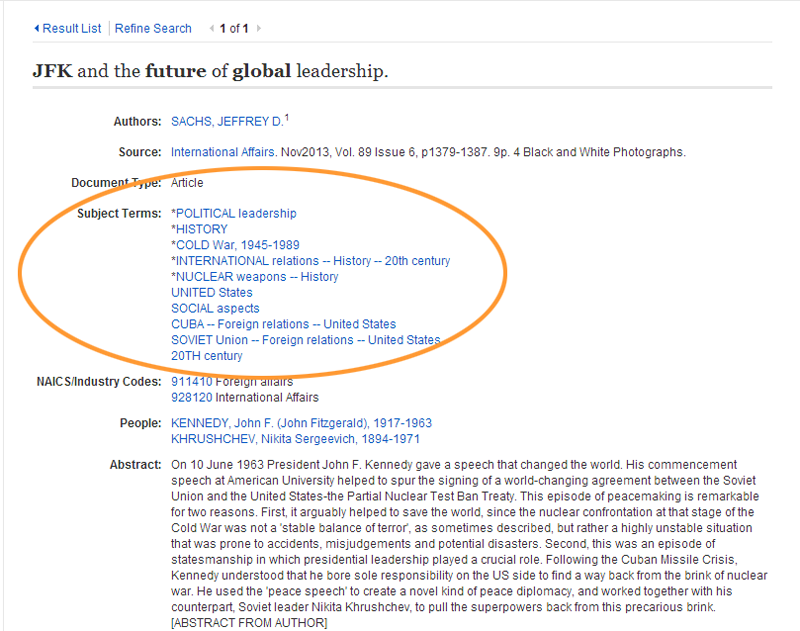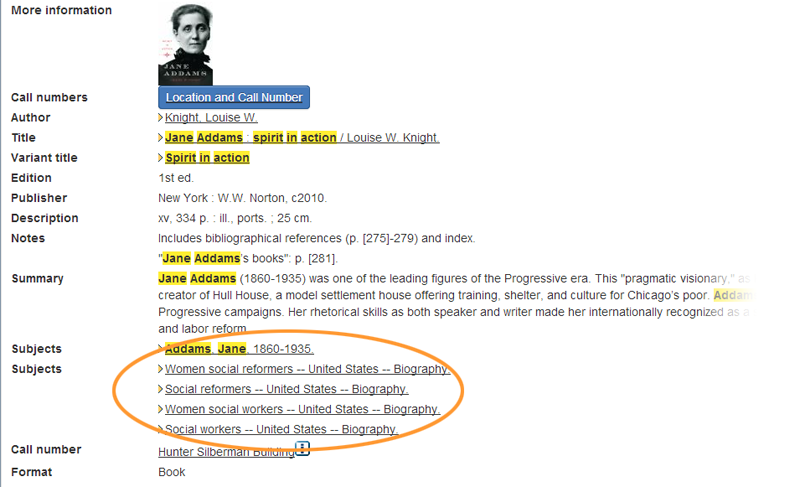We don’t just read sources to find material for our papers. Good sources also lead us to new questions and new sources. This lesson will show you how to use a source’s keywords, questions and bibliography to lead you to other useful sources. This skill can help you discern a conversation occurring among a set of scholars or writers about your topic.
Keywords:
- If you’re reading a scholarly article in a library database, you can make use of both the keywords (selected by the author) and the subject-terms (usually determined by the database).

- If you’re reading a book, you have two options. First, using the book’s call number (generally found on the side or spine of the book), find the book in the stacks. Nearby books should be on a similar subject. You can also go back to the book’s record in the library catalog. Each book is assigned at least one library subject. Click the subject to find other books with the same subject.

- If you’re reading a scholarly article in a library database, you can make use of both the keywords (selected by the author) and the subject-terms (usually determined by the database).
Bibliography: Being able to interpret your MLA, APA, or Chicago style (whatever your discipline recommends) citation is helpful so you can find the sources that seem useful. As you read, be sure to note any citations that seem interesting or relevant. You can use the bibliography to find their full details when you have finished reading. Alternately, when you have finished the article, you can give the Works Cited page a once-over in order to identify any interesting readings you’d like to find. Reading a Bibliography has more on this.
Author: Academic writers often write on the same topic and publish several books or articles about the topic. Put the author’s name into a database or Google Scholar search and see what else s/he has published about the topic. The authors may have even published an update to the current study you are reading.
- If you are reading a book review of a book that seems to relate to your topic, not only should you search for the book, but you should also search for the author of the book review, since scholars often review books on topics they have written about.
Questions or Conclusions: Whether a scholarly book or journal article, authors often conclude their work with recommendations for further research. You, as a researcher, can heed their suggestions, even if you’re only working on a small project.
Google Scholar is also useful in tracking what work has cited the work you are reading. If you come across a study that seems dated, but is on an interesting topic, search for the article in Google Scholar to find more recent articles that have cited the original article. You may find more updated information more relevant to your topic.

Finally, if you have a citation for a journal article and you want to know if the Hunter College Libraries has it, use the eJournals link. You’ll need to know the name of the journal and the publication date (year, as well as volume number) -- not just the title of the article.

Research Toolkit by Wendy Hayden and Stephanie Margolin is licensed under a Creative Commons Attribution-NonCommercial-ShareAlike 4.0 International License.